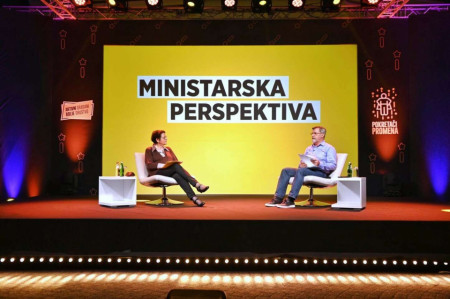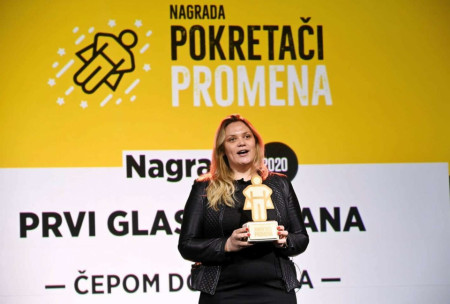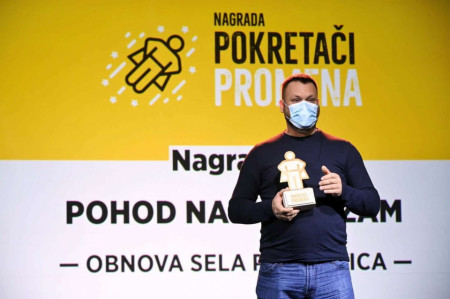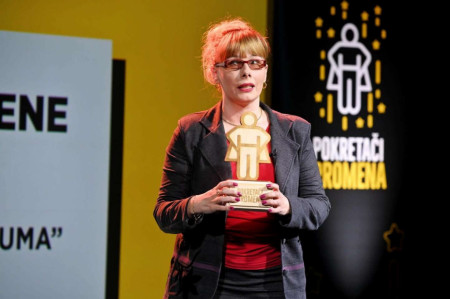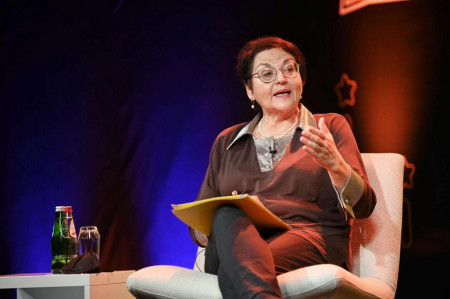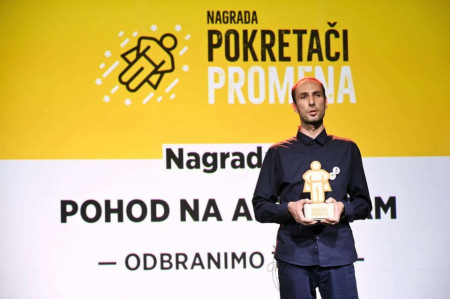On Wednesday, November 25th, 2020, the Belgrade Open School (BOS), the Belgrade Fund for Political Excellence (BFPE) and the Balkan Investigative Reporting Network Serbia (BIRN Serbia) held an online conference entitled Dialogue: Cooperation for Change. At the conference, awards were given to the best change makers for the current year, and in the second part of the conference, participants had the opportunity to engage in dialogue with Gordana Čomić, the Minister of Human and Minority Rights and Social Dialogue.
WHO ARE CHANGE MAKERS in 2020?
The change-makers are active citizens who put their effort in building a better society. These awards celebrate the most inspiring and successful advocacy campaigns and encourage us to work for positive change in the community.
The 2020 change makers awards were presented in four categories:
Category I: Cooperation for changes - examples of good practice and successful cooperation between public authorities and civil society organizations
- Winner: the Association of the Blind of Serbia (Savez slepih Srbije) for the initiative "Ratification of the Marrakesh Agreement" whose aim is greater accessibility of written materials for the blind, visually impaired and other persons with disabilities.
Category II: The first voice of the citizens - a campaign that gathered a large number of citizens around its goal
- Winner: "With the plug to smile" (Čepom do osmeha) for the initiative of the same name, whose campaign provides assistance to children with disabilities and developmental disabilities.
Category III: Campaign for activism - successful initiatives of informal groups, within which the award was shared between two projects
- Winner: Informal group "Pakleštica uvek" aimed at rebuilding villages on the maountain Stara Planina and the initiative "Let's defend Tesla", a group of citizens from Pančevo who is dedicated to protection of green areas in their neighborhood.
Category IV: Change-makers:
- Winner: Milja Vuković, Zero & Low Waste Serbia, which is recognized by the community as a person who inspires others in the field of of environmental protection.
Special thanks were given to the following initiatives:
- Radmila Urošević, Zvezdara Volunteer Service initiative (Volonterski servis Zvezdare) – for contribution to strengthening volunteerism;
- Užice High School Literary Festival for the initiative Halfway (Književni festival Užičke gimnazije “Na pola puta”) – for the contribution of young people to cross-border and regional cooperation;
- Rural Cultural Center Markovac (Seoski kulturni centar Markovac) – for gender equality and improvement of culture in rural communities;
- Kotež Group (Grupa Kotež) – for community mobilization;
- Sombor tailors’ group (Somborske šnajderke) – for solidarity in the crisis.
COOPERATION BETWEEN THE GOVERNMENT AND CIVIL SOCIETY: WHAT IS THE PERSPECTIVE?
The Ministry of Human and Minority Rights and Social Dialogue was established within the newly formed Government. The mandate of the Ministry is to initiate a dialogue with civil society on issues of common interest, further development and implementation of strategic documents; to create a supportive environment for civil society development and further improve cooperation between public authorities, civil society and the private sector.
The topics of the panel in the second part of the conference were related to the priorities and mission of the Ministry, as well as mapping proposals for cooperation with civil society, both with the Ministry and with other public authorities.
I am extremely grateful I have the opportunity to participate in the dialogue with tireless activists of civil society organizations and international organizations. The idea is to be at service of developing a dialogue. My proposal is that everyone in public positions should listen to criticism, which is for the benefit of the entire society, and that representatives of civil society should share their knowledge with all the citizens of Serbia, said Gordana Čomić, Minister of Human and Minority Rights and Social Dialogue.
The most advanced countries are those that tend constructive cooperation between the governmental and non-governmental sectors, including civil society, private business and the media, added Shanley Pinchotti, a.d. USAID Serbia.
This event was organized as part of the project "Active Citizens - Better Society: Advocacy for Cooperation and Democratic Development", supported by the United States Agency for International Development (USAID). This four-year project was launched in November 2018 and aims to improve the practice of public advocacy in civil society, represent the interests of local communities and actively involve citizens in the work of civil society organizations. The event was also supported by the "Europe for Citizens" program (the Republic of Serbia has participatedin this program since 2012) which aims to encourage democratic engagement and civic participation, as well as the promotion of European identity and European citizenship.

